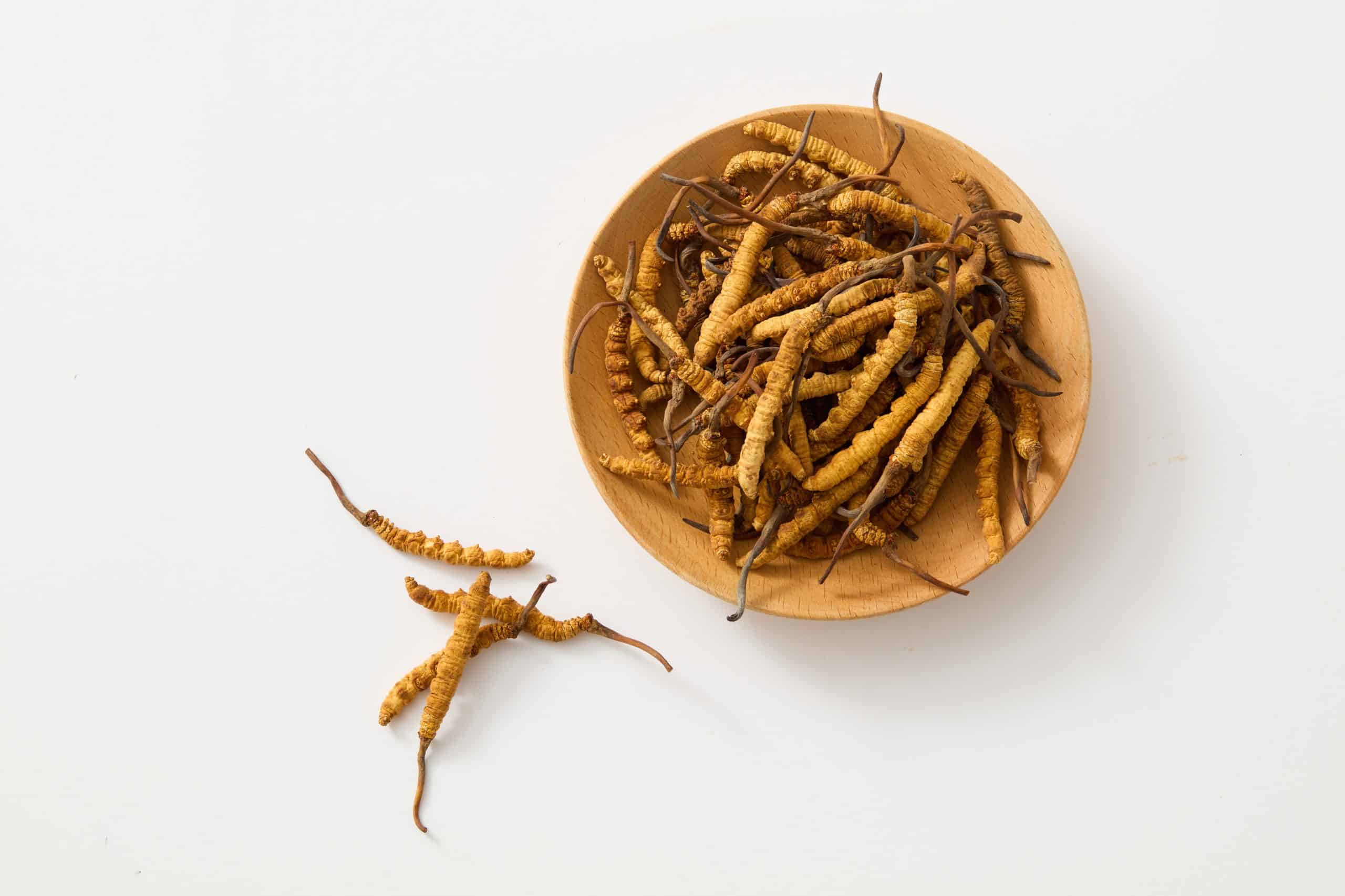For years, humans have used fungi for medicinal and culinary purposes. From the well-known button mushroom that garnishes our pizzas, to the rare truffle sought after by gourmet chefs, and even the controversial psilocybin for its mind-altering properties.
Our interest today is on cordyceps, a unique fungus that seemingly defies the constraints of nature.
Oddly, it begins its life cycle by invading the body of an insect, only to sprout from the host in a dramatic display of parasitic survival.
But beyond this macabre lifecycle, cordyceps are believed to harbor numerous health benefits, which has piqued the interest of researchers and health enthusiasts alike.
Let’s review what’s known, what’s up for debate, and what potential this peculiar fungus holds for our health and wellness.
What Does Cordyceps Do To The Body?
Small, lab-based studies suggest that cordyceps, particularly C. sinensis and C. militaris, may have potential benefits ranging from anti-inflammatory, antioxidant, and anticancer properties to improved athletic performance (5) (11).
Betterme will keep you laser-focused on your weight loss journey! Nutrient-packed meal plans, fat-blasting workouts, galvanizing challenges and much more. Try using the app and see for yourself!
Let’s look at each of these cordyceps mushroom benefits in detail:
Decreases Inflammation
Cordyceps contains bioactive compounds, including cordycepin and polysaccharides, which are believed to contribute to their anti-inflammatory properties. These compounds work by inhibiting the expression of certain proteins and pathways in the body that trigger inflammation (4) (8) (17).
If left unchecked, chronic inflammation could be a contributing factor to heart disease, cancer, and even Alzheimer’s (3). So, by potentially reducing inflammation, cordyceps could help in mitigating the risk of these conditions.
Slows Down Tumor Growth
Some studies on cordyceps’ effects on cancer have shown promising results.
For instance, a study found that C. militaris extract inhibited the growth of prostate cancer cells in mice (6). Another study suggests that cordyceps could enhance the effectiveness of chemotherapy drugs and potentially reduce their side effects (9).
The mechanism behind cordyceps’ potential anticancer effect could be its ability to induce cancer cell death and inhibit angiogenesis (the formation of new blood vessels that support tumor growth) (1) (2).
Furthermore, the anti-inflammatory properties of cordyceps could also play a role in reducing the risk of cancer, as chronic inflammation has been linked to the development of certain types of cancer (4).
However, more studies are needed to confirm these findings and understand how cordyceps can be used in cancer treatment. What we have so far are the results of test-tube and animal studies, which may not necessarily translate to the same effects in humans.
Improves Athletic Performance
One of the most popular uses of cordyceps is for improving athletic performance. This benefit stems from a traditional use of cordyceps in Chinese medicine as an energy booster.
And with its potential anti-inflammatory and antioxidant properties, it’s not surprising that athletes and fitness enthusiasts have turned to cordyceps as a natural performance enhancer.
Some studies of humans and animals have shown that cordyceps may improve physical endurance by increasing oxygen uptake and reducing fatigue (7) (21).
However, the evidence is not consistent across all studies, and more research needs to be done to confirm whether or not cordyceps benefits lungs.
Additionally, the quality and purity of cordyceps supplements can greatly impact their potential benefits for athletic performance.
Read more: Kimchi: Calories, Nutrition, and Health Benefits
Slows Down Aging
The antioxidant properties of cordyceps have led some researchers to believe that it could potentially slow down the aging process (10).
Free radicals are damaging molecules produced in our body as a result of various processes, including metabolism and exposure to environmental toxins. These free radicals can cause cellular damage and contribute to aging and age-related diseases (13).
Antioxidants neutralize these free radicals, preventing them from causing harm to our cells (14). And because cordyceps contains these antioxidant compounds, it could potentially slow down the aging process and reduce the risk of age-related diseases.
Regulates Blood Sugar Levels
The presence of bioactive compounds like polysaccharides, which could enhance glucose metabolism, has led to the belief that cordyceps could be beneficial for individuals with diabetes (20).
In fact, some animal studies have shown that cordyceps may improve blood sugar control and potentially reduce insulin resistance (16) (23).
The ripple effect of this could include a decreased risk of complications associated with diabetes, such as cardiovascular disease and nerve damage.
However, more research is needed to confirm these findings in humans, particularly those with type 2 diabetes. And individuals with diabetes should consult their healthcare provider before incorporating cordyceps into their treatment plan.
Does Cordyceps Affect Hormones?
There are some claims that cordyceps may have a positive effect on hormones, particularly in men. Some animal studies suggest that it may increase testosterone levels and potentially improve sexual function (12) (15).
However, these claims are based on limited research and mostly involve animal studies. More studies are needed to confirm these cordyceps benefits for male.
How Do Cordyceps Make You Feel?
Some fungi are known for having a near-instantaneous effect on the human body, such as the psychedelic properties of psilocybin mushrooms (24). But cordyceps effects are subtler and may take longer to manifest.
In traditional Chinese medicine, cordyceps is used to treat fatigue and enhance energy levels. Some individuals who take a cordyceps supplement regularly report feeling more energized and focused after regular use.
Others have also reported improved sleep, mood, and even libido. However, more research is needed to understand the mechanisms behind these potential effects and confirm their efficacy.
Do You Have To Take Cordyceps Everyday?
There are no solid guidelines for how often you should take cordyceps, but experts recommend taking breaks every once in a while from supplementation to prevent building a tolerance.
For general health and wellness, some experts recommend taking between 500 to 1,000 milligrams of cordyceps extract daily.
However, for specific conditions like diabetes or cancer, it’s best to consult with a healthcare provider for personalized recommendations.
Additionally, the quality and purity of cordyceps supplements can greatly impact their potential benefits.
For one; these fungi are incredibly expensive to grow in the lab, so some manufacturers may cut corners and use subpar ingredients.
To ensure safety and efficacy, it’s best to purchase cordyceps supplements from reputable brands that undergo third-party testing for quality and purity.
BetterMe app will kick you out of the mental funk, shake off your extra weight, rid you off your energy-zapping habits, and help you sculpt the body of your dreams. Intrigued? Hurry up and change your life for the better!
Can Cordyceps Harm?
Many people tolerate cordyceps well, and there have been no documented cases of serious adverse effects. However, first-time users may experience upset stomach, nausea, or diarrhea.
These symptoms are usually mild and resolve on their own. The best time to take cordyceps supplements is with a meal to avoid any potential stomach upset.
There is also a risk of allergic reactions, particularly in individuals with mushroom allergies. If you have any known allergies, you may want to steer clear of these.
Who Should Not Take Cordyceps?
The safety of long-term use of cordyceps has not been fully established. Most studies on cordyceps have been short-term, and we don’t know what effects long-term use could have on our health.
Secondly, because cordyceps may stimulate the immune system, individuals with autoimmune diseases or those taking immunosuppressant drugs should exercise caution when using cordyceps.
Other potential interactions to watch out for include those with blood-thinning medications and those with kidney or liver disease.
Additionally, because cordyceps can affect blood sugar levels, individuals with diabetes should monitor their blood sugar closely when incorporating cordyceps into their treatment plan.
The limiting factor in cordyceps dangers research is its rarity and high cost, which makes it difficult for large-scale clinical trials to be conducted.
However, as more people become interested in this fungus and its potential benefits, we can expect continued research and possibly even higher-quality supplements becoming available.
What’s The Best Way To Take Cordyceps?
Cordyceps supplements come in various forms, including capsules, powders, and tinctures. While there isn’t a significant difference in terms of efficacy between these forms, some may find it easier to incorporate capsules into their daily routine.
If you prefer powder or tincture form, you can mix it into your morning smoothie, make coffee with it (we discuss that in detail in our piece on mushroom coffee benefits), or add it to your meals.
Alternatively, you can also find cordyceps in whole form, which can be added to soups and stews.
Eating them raw is an option, but they do have a slightly bitter taste and may be difficult to chew.
Read more: Green Tea Intermittent Fasting: Benefits and Side Effects
FAQs
What to Avoid When Taking Cordyceps?
Avoid taking cordyceps if you have any known allergies to mushrooms or mold. If you experience an upset stomach, nausea, or diarrhea after taking cordyceps, discontinue use and consult with your healthcare provider.
Also, avoid taking cordyceps if you have any autoimmune diseases or are taking immunosuppressant drugs. It’s also important to monitor your blood sugar levels closely if you have diabetes.
Does Cordyceps Increase Estrogen?
There’s limited scientific evidence to suggest that Cordyceps directly increases estrogen levels.
However, some studies imply that Cordyceps can support overall hormonal balance, which may indirectly influence estrogen levels (22). This particular cordyceps benefit for females is not well understood and requires further research.
Does Cordyceps Raise Testosterone?
Some animal studies suggest Cordyceps might have the potential to increase testosterone levels, leading to improvements in sexual function and energy. However, more human research is needed to confirm these potential benefits.
How Long Does It Take for Cordyceps to Work?
Some people may notice benefits within a few days of regular supplementation, while others may take a few weeks to notice any changes. Unlike medications, cordyceps works subtly over time to balance the body and promote overall wellness.
What Happens if You Have Too Much Cordyceps?
Consuming too much Cordyceps may lead to potential side effects like stomach upset, nausea, or diarrhea. In rare instances, overconsumption could potentially trigger allergic reactions, especially in those with sensitivities to mushrooms.
Does Cordyceps Infect the Brain?
There is no evidence to suggest that cordyceps infects the human brain. In fact, some studies have shown that cordyceps may have neuroprotective effects and potentially help with memory and cognitive function (18) (19).
This myth likely stems from the cordyceps fungus’ parasitic lifestyle, where it infects and takes over the bodies of insects. Popular TV shows and movies have likely perpetuated this misconception, but there is no scientific evidence to support it.
The Bottom Line
Cordyceps is a fascinating and complex organism that has captured the attention of both researchers and health enthusiasts. While it may have potential benefits for the body, more research is needed to fully understand its effects and how it can be used in various health conditions.
Caution should be exercised when using cordyceps, particularly in individuals with preexisting health conditions or those taking medications.
That said, the future of cordyceps as a therapeutic agent looks promising and could potentially offer many benefits for our overall health and well-being.
DISCLAIMER:
This article is intended for general informational purposes only and does not serve to address individual circumstances. It is not a substitute for professional advice or help and should not be relied on for making any kind of decision-making. Any action taken as a direct or indirect result of the information in this article is entirely at your own risk and is your sole responsibility.
BetterMe, its content staff, and its medical advisors accept no responsibility for inaccuracies, errors, misstatements, inconsistencies, or omissions and specifically disclaim any liability, loss or risk, personal, professional or otherwise, which may be incurred as a consequence, directly or indirectly, of the use and/or application of any content.
You should always seek the advice of your physician or other qualified health provider with any questions you may have regarding a medical condition or your specific situation. Never disregard professional medical advice or delay seeking it because of BetterMe content. If you suspect or think you may have a medical emergency, call your doctor.
SOURCES
- Anti-cancer effect of Cordyceps militaris in human colorectal carcinoma RKO cells via cell cycle arrest and mitochondrial apoptosis (2015, link.springer.com)
- Anti-tumor effect of Cordyceps militaris in HCV-infected human hepatocarcinoma 7.5 cells (2015, pubmed.ncbi.nlm.nih.gov)
- Chronic Inflammation (2023, ncbi.nlm.nih.gov)
- Cordycepin for Health and Wellbeing: A Potent Bioactive Metabolite of an Entomopathogenic Medicinal Fungus Cordyceps with Its Nutraceutical and Therapeutic Potential (2022, mdpi.com)
- Cordyceps as an Herbal Drug (2011, ncbi.nlm.nih.gov)
- Cordyceps militaris Extract and the Main Component, Cordycepin, Modulate the Functions of Prostate Cancer Cells Partially Through the Adenosine A1 Receptor (2022, journals.sagepub.com)
- Cordyceps militaris improves tolerance to high intensity exercise after acute and chronic supplementation (2018, ncbi.nlm.nih.gov)
- Cordyceps sinensis as an immunomodulatory agent (1996, pubmed.ncbi.nlm.nih.gov) i
- Cordyceps sinensis Health Supplement Enhances Recovery from Taxol-Induced Leukopenia (2009, ncbi.nlm.nih.gov)
- Cordyceps sinensis: Genotoxic Potential in Human Peripheral Blood Cells and Antigenotoxic Properties Against Hydrogen Peroxide by Comet Assay (2016, pubmed.ncbi.nlm.nih.gov)
- Cordyceps spp.: A Review on Its Immune-Stimulatory and Other Biological Potentials (2021, frontiersin.org)
- Effects of Cultured Cordycep militaris on Sexual Performance and Erectile Function in Streptozotocin-Induced Diabetic Male Rats (2020, hindawi.com)
- Free radicals, antioxidants and functional foods: Impact on human health (2010, ncbi.nlm.nih.gov)
- Free Radicals, Antioxidants in Disease and Health (2008, ncbi.nlm.nih.gov) m
- Functional study of Cordyceps sinensis and cordycepin in male reproduction: A review (2017, sciencedirect.com)
- Hypoglycemic Activity through a Novel Combination of Fruiting Body and Mycelia of Cordyceps militaris in High-Fat Diet-Induced Type 2 Diabetes Mellitus Mice (2015, hindawi.com)
- Immunomodulatory functions of extracts from the Chinese medicinal fungus Cordyceps cicadae (2002, pubmed.ncbi.nlm.nih.gov)
- Improvement of Learning and Memory Induced by Cordyceps Polypeptide Treatment and the Underlying Mechanism (2018, hindawi.com)
- Neuroprotective and therapeutic effect of Cordyceps militaris on ischemia-induced neuronal death and cognitive impairments (2019, sciencedirect.com)
- Polysaccharides from natural resource: ameliorate type 2 diabetes mellitus via regulation of oxidative stress network (2023, frontiersin.org)
- Studies on the Antifatigue Activities of Cordyceps militaris Fruit Body Extract in Mouse Model (2015, hindawi.com)
- System-level investigation of anti-obesity effects and the potential pathways of Cordyceps militaris in ovariectomized rats (2022, biomedcentral.com)
- The anti-hyperglycemic activity of the fruiting body of Cordyceps in diabetic rats induced by nicotinamide and streptozotocin (2004, sciencedirect.com)
- The Therapeutic Potential of Psilocybin (2021, mdpi.com)










